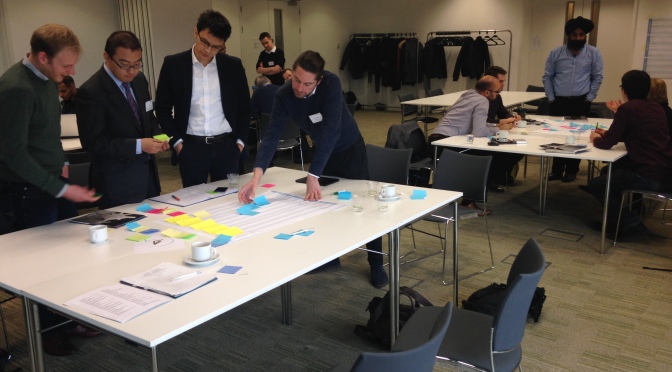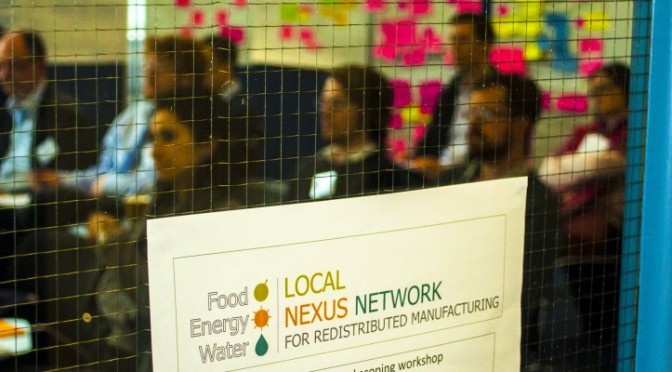In the same vein as the first scoping 3DP-RDM workshop in 2015, the 2016 scoping workshop featured two distinct discussion activities. These activities were aimed at identifying research topics for investigation during the feasibility studies that will be conducted later in the year.
The process used was the same as in 2015. For the first discussion activity this process is described in this earlier blog post.
Outputs of the prioritisation process
The following table summarises the list of 30 research topics that groups identified and the number of votes that each received during the prioritisation. Some of the topics were very similar and loosely clustered prior to voting. This similarity explains why several topics at the bottom of the list received few votes in comparison to those higher up the list.
| Group | Topic | Votes |
|
2 |
Education: 3D design skill as a new form of “literacy” |
11 |
|
6 |
What does the ecosystem and business model look like for different sectors/products? |
10 |
|
5 |
New design tools for AM and RDM |
9 |
|
2 |
Design: customer-driven, design principles and guidelines for non engineers |
9 |
|
6 |
How does cost effectiveness differ in centralised vs RDM for AM? Urgency |
9 |
|
2 |
Product liability: standards and regulations around quality and performance. Allocate responsibility |
8 |
|
1 |
Quality metrics: what, how, when? |
7 |
|
6 |
Integrated CAD system, geometry/material composition/quality control/integrity/rights management |
7 |
|
2 |
Does 3DP enhance production operation responsiveness? |
6 |
|
5 |
Collaboration and linking with different prducers, end-users and suppliers |
6 |
|
1 |
DRM versus legal contracts for 3DP-RDM applications |
5 |
|
1 |
MIS for 3DP-RDM |
5 |
|
3 |
Regulations: impact of existing regulations and those made for conventional manufacturing |
5 |
|
3 |
Design and development framework |
5 |
|
3 |
How does 3DP-RDM make business opportunities? |
5 |
|
1 |
Challenge of ‘prodsumption’: co-locating making and buying/consuming |
5 |
|
4 |
Scenarios of 3DP factories/ factory networks of the future |
5 |
|
3 |
Distribution and control of data: how do you disseminate product model information, control it, who is responsible and holds the IP? |
4 |
|
5 |
Resilience and risk reduction compared to conventional manufacturing: how can we redistribute manufacturing to increase residuals? |
4 |
|
1 |
New design systems and exchange protocols |
3 |
|
4 |
How can we engage people (customers) to use 3DP technology? |
3 |
|
3 |
Skills and infrastructure: in an RDM scenario, what skills will be required? What does the respective CAD and software look like? |
3 |
|
2 |
Supporting production planning systems / build configuration and scheduling |
2 |
|
6 |
How are customised products by AM (for healthcare) regulated/controlled? |
2 |
|
5 |
Reproducibility and reliablity: control of AM quality and reducing risk of failure |
2 |
|
4 |
Through-life of 3D printed items and their monetisation |
2 |
|
4 |
What is the best 3DP policy: proactive or reactive? |
1 |
|
4 |
Tracking/tracing of IP in 3DP including counterfeiting, revenues and liability |
0 |
|
6 |
How is quality control organised in RDM for AM? |
0 |
|
5 |
Skills, education, standards |
0 |
Participants and groups
| Name | Organisation | Group |
| Ahmad Beltagui | University of Wolverhampton, Business School |
4 |
| Alexander Pasko | Bournemouth University, National Centre for Computer Animation |
1 |
| Andrew Triantaphyllou | MTC |
3 |
| Bo Chen | Coventry University, Manufacturing and Materials Engineering Research Centre |
5 |
| Chander Velu | University of Cambridge, Institute for Manufacturing |
6 |
| Chaozong Liu | University College London, Institute of Orthopaedic & Musculoskeletal Science |
6 |
| Christopher Noyce | ESRC |
3 |
| Deepak Kalaskar | University College London, UCL Centre for Nanotechnology & Regenerative Medicine |
3 |
| Dominik Deradjat | University of Cambridge, Centre for Technology Management |
5 |
| Hans Veldhuis | University of Oxford |
5 |
| Jag Srai | University of Cambridge, Centre for International Manufacturing |
4 |
| Josef Hazi | University of Oxford, Oxford 3D Printing Society |
4 |
| Konstantinos Salonitis | Cranfield University |
2 |
| Letizia Mortara | University of Cambridge, Centre for Technology Management |
4 |
| Malte Ressin | Brunel University |
3 |
| Martin Baumers | University of Nottingham |
2 |
| Mélanie Despeisse | University of Cambridge, Centre for Technology Management |
2 |
| Meurig Beynon | University of Warwick, Department of Computer Science |
3 |
| Mudassar Ahmed | University of Cambridge, Distributed Information and Automation Laboratory |
2 |
| Oleg Fryazinov | Bournemouth University, National Centre for Computer Animation |
4 |
| Patrick Hennelly | Sology Charters & University of Cambridge, Centre for International Manufacturing |
5 |
| Phill Dickens | University of Nottingham |
6 |
| Serena Flammini | University of Cambridge, Centre for Technology Management |
6 |
| Susan Reiblein | HP Enterprise |
1 |
| Tim Minshall | University of Cambridge, Centre for Technology Management |
1 |
| Valery Adzhiev | Bournemouth University, National Centre for Computer Animation |
6 |
| Xiao Li | University of Cambridge, Centre for Industrial Sustainability |
1 |



